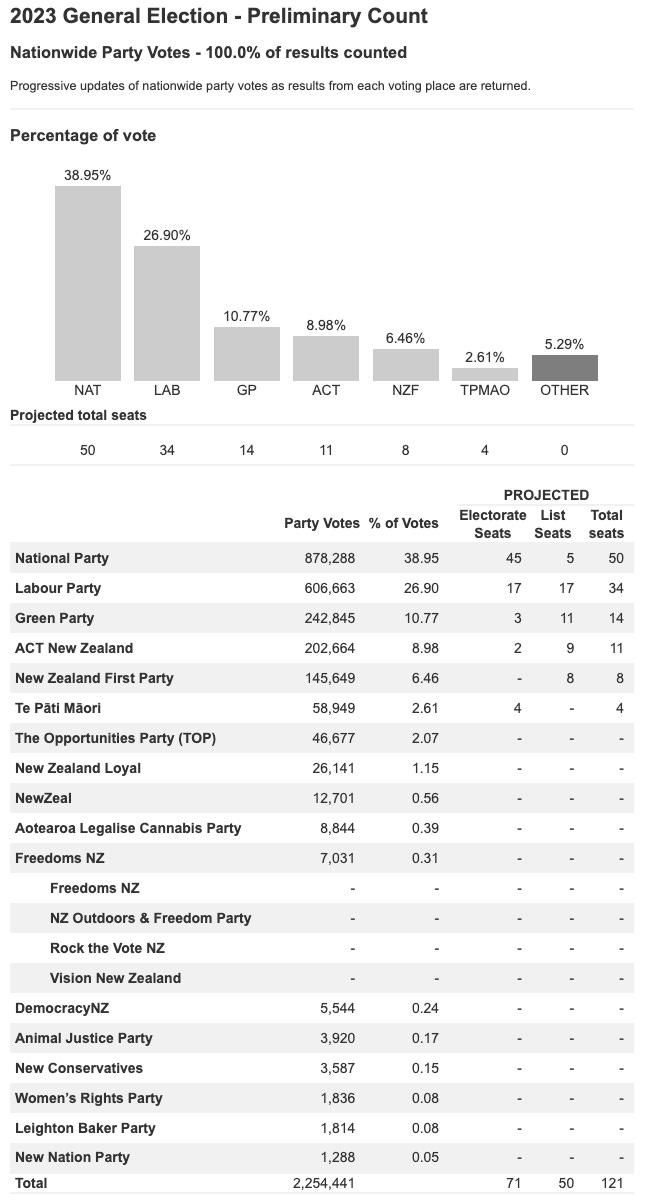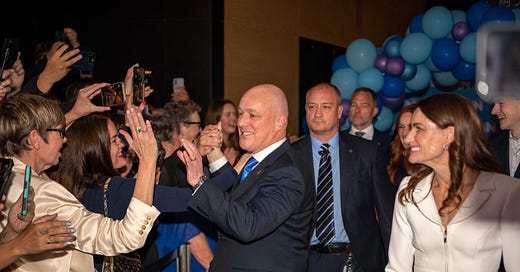
TL;DR: National (38.9% and 50 seats) won the election overnight and will now have to decide how it forms a Government with both ACT (8.98% and 11 seats) and New Zealand First (6.46% and eight seats). National didn’t win quite enough seats to govern comfortably alone with ACT so will have to so something with Winston Peters, even if it is peripheral, outside Cabinet and includes a few baubles.
The details won’t be clear until the specials are counted and we find out what the baubles look like. They could include some sort of new Provincial Growth Fund and a ministerial role for Peters and Shane Jones outside Cabinet, potentially even including Peters being Foreign Minister and Racing Minister, with Jones running PGF V 2.0. Peters agreed to be Foreign Minister outside Cabinet in Labour’s final third term from 2005 to 2008 and got a super-gold card thrown in for good measure.
Labour (26.9% and 34 seats) lost badly and now faces an internal reckoning. Former leader David Cunliffe was happy to give advice last night, suggesting Labour’s centrism was the problem. I doubt the Labour caucus will like his advice.
The Green Party (10.77% and 14 seats) and Te Pāti Māori (2.61% and four electorate seats) did better than Labour and than some expected, winning seven electorate seats and 11 list seats between them, which means together they are more than half the size of Labour in Parliament. The Opportunities Party failed to win Ilam and its 46,471 party votes (2.01%) were wasted.
The final count of 567,000 special votes and the exact results of a couple of tight electorates will determine just how much negotiating power Christopher Luxon has in discussions with Winston Peters. National and ACT currently have 61 seats in a currently-121-seat Parliament, which isn’t quite enough to govern alone, and certainly not comfortably.
National could add to that 61 with a win in the Port Waikato by-election on November 25, but the history of special vote counts is that Labour and/or Green pick up one or two from National. My guess is National wins Port Waikato but loses one seat to the Greens or Labour in the specials, so would still have 61 seats in a 122-seat Parliament. That’s not enough for National-ACT to govern alone.
It is likely Luxon will try to get NZ First into some sort of supply and confidence agreement to be more comfortable, similar to the one NZ First did with Labour in 2005. NZ First is not in a strong enough position to demand major policy concessions on National’s tax cuts, but may try to keep the current ban on most foreign residents (excluding Singapore and Australia) buying land. That would create a revenue headache for National’s tax cuts.
However, National’s plans to repeal interest deductibility and tighten bright line back to two years from 10 years are likely to go through, along with the repeal of Three Waters. NZ First said in its manifesto it wanted to reinstate interest deductibility for rental property investors. Interestingly, its only comments on foreign ownership related to a ban on foreigners buying land for conversion to forestry.
There was no specific reference to blocking any attempt to lift a foreign ban on buying houses and during the election campaign Winston Peters only challenged the likely tax receipts from lifting the ban, rather than being specifically opposed to lifting the ban itself. He said he would reserve judgement until he had seen the details.
“I’m open minded, I’ll look at it… but please show us now,” Peters said on September 30 via TeAoNews
The detailed results, what it means, and what happens next
Here’s the full results from the Electoral Commission before the counting of special votes.

So what does it mean?
Now the post-mortem starts for Labour. How did it go from 50.0% and 65 seats in 2020 to 27% and 34 seats in 2023? Cabinet minister Nanaia Mahuta lost her seat and is not on the list so is out. Former Cabinet Ministers Michael Wood and Phil Twyford lost their electorate seats and were low on the list and so are out. MPs Tamati Coffey (list but standing for East Coast), Sarah Pallett (Ilam) and Anna Lorck (Tukituki) also lost their electorates and seats.
In my view, Labour lost the 2023 election in 2017 when it committed to the Budget Responsibility Rules, while also committing to 100,000 Kiwibuild homes, the Auckland CBD-Airport rail line, welfare reform and a capital gains tax review. They were incompatible and the inevitable disappointment upon failing on Kiwibuild, light rail, and welfare reform was disguised in 2020 by the initial covid success and the unpopularity of then-National leader Judith Collins. The revolt against Government over the covid restrictions in late 2021 punctured that 2020 election bubble.
Now what happens?
National and ACT will govern with Winston Peters in there somewhere and somehow, but probably outside Cabinet. My wild speculation is he is made Foreign and Racing Minister outside Cabinet and wangles some form of Provincial Growth Fund. I would love to see NZ First get the 30-year population strategy review it talks about in its manifesto, but I doubt National or ACT would want that.
National and ACT will then repeal interest deductibility, the 10-year bright line test, Three Waters, the RMA and the ‘ute tax’ in the clean car rebate scheme. It will also freeze new capital spending on housing and transport while it reviews Kāinga Ora and looks at which motorways to build. That will further slow new housing consents, at least until next year, as councils wait to know how any water, roading and housing infrastructure is paid for. Migration will ramp up even further, creating even more upwards pressure on rents from a lack of supply, and boost house prices.
The housing market will take off again, from today. I stick with my view residential land prices will rise 20% because of this result, while the emigration of New Zealand citizens and residents to Australia and elsewhere will continue apace, with ever more temporary workers to replace them.
As a bonus, I had this great chat with
this and will re-post his piece from this morning for subscribers to the The Kākā.Ka kite ano
Bernard














Share this post